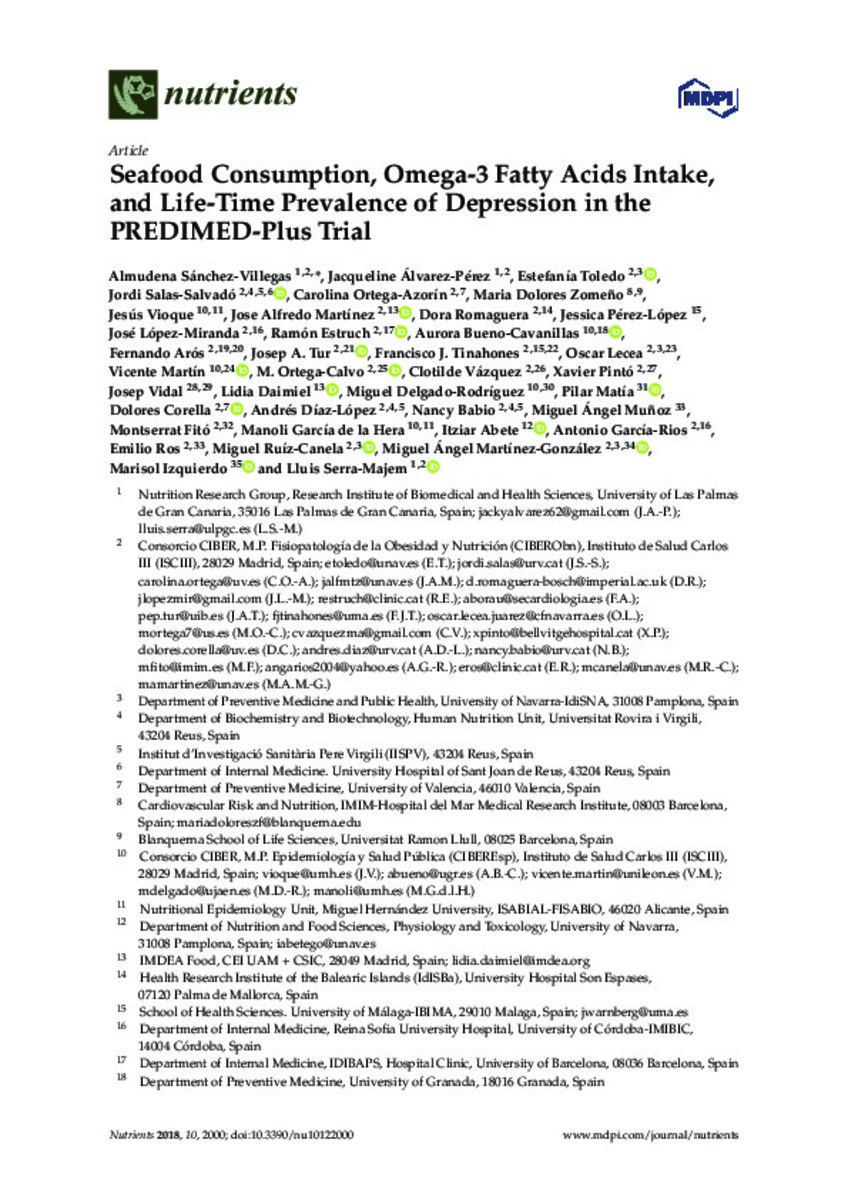Full metadata record
| DC Field | Value | Language |
|---|---|---|
| dc.creator | Sanchez-Villegas, A. (Almudena) | - |
| dc.creator | Alvarez Perez, J. (Jacqueline) | - |
| dc.creator | Toledo, E. (Estefanía) | - |
| dc.creator | Salas-Salvado, J. (Jordi) | - |
| dc.creator | Ortega-Azorin, C. (Carolina) | - |
| dc.creator | Zomeño, M.D. (María Dolores) | - |
| dc.creator | Vioque, J. (Jesús) | - |
| dc.creator | Martinez, J.A. (José Alfredo) | - |
| dc.creator | Romaguera, D. (Dora) | - |
| dc.creator | Pérez-Lopez, J. (Jessica) | - |
| dc.creator | López-Miranda, J. (José) | - |
| dc.creator | Estruch, R. (Ramón) | - |
| dc.creator | Bueno-Cavanillas, A. (Aurora) | - |
| dc.creator | Aros, F. (Fernando) | - |
| dc.creator | Tur, J.A. (Josep A.) | - |
| dc.creator | Tinahones, F.J. (Francisco J.) | - |
| dc.creator | Lecea, O. (Oscar) | - |
| dc.creator | Martin, V. (Vicente) | - |
| dc.creator | Ortega-Calvo, M. (Manuel) | - |
| dc.creator | Vázquez, C. (Clotilde) | - |
| dc.creator | Pinto, X. (Xavier) | - |
| dc.creator | Vidal, J. (Josep) | - |
| dc.creator | Daimiel, L. (Lidia) | - |
| dc.creator | Delgado-Rodriguez, M. (Miguel) | - |
| dc.creator | Matia, P. (Pilar) | - |
| dc.creator | Corella, D. (Dolores) | - |
| dc.creator | Diaz-Lopez, A. (Andres) | - |
| dc.creator | Babio, N. (Nancy) | - |
| dc.creator | Muñoz, M.A. (Miguel Angel) | - |
| dc.creator | Fito, M. (Montserrat) | - |
| dc.creator | García Hera, M (Manoli) de la | - |
| dc.creator | Abete, I. (Itziar) | - |
| dc.creator | Garcia-Rios, A. (Antonio) | - |
| dc.creator | Ros, E. (Emilio) | - |
| dc.creator | Ruiz-Canela, M. (Miguel) | - |
| dc.creator | Martinez-Gonzalez, M.A. (Miguel Ángel) | - |
| dc.creator | Izquierdo, M. (Marisol) | - |
| dc.creator | Serra-Majem, L. (Luis) | - |
| dc.date.accessioned | 2019-03-21T12:49:26Z | - |
| dc.date.available | 2019-03-21T12:49:26Z | - |
| dc.date.issued | 2018-12-18 | - |
| dc.identifier.citation | Sanchez-Villegas, A. (Almudena) | es_ES |
| dc.identifier.issn | 2072-6643 | - |
| dc.identifier.uri | https://hdl.handle.net/10171/56649 | - |
| dc.description.abstract | Background: The aim of this analysis was to ascertain the type of relationship between fish and seafood consumption, omega-3 polyunsaturated fatty acids (ω-3 PUFA) intake, and depression prevalence. Methods: Cross-sectional analyses of the PREDIMED-Plus trial. Fish and seafood consumption and ω-3 PUFA intake were assessed through a validated food-frequency questionnaire. Self-reported life-time medical diagnosis of depression or use of antidepressants was considered as outcome. Depressive symptoms were collected by the Beck Depression Inventory-II. Logistic regression models were used to estimate the association between seafood products and ω-3 PUFA consumption and depression. Multiple linear regression models were fitted to assess the association between fish and long-chain (LC) ω-3 PUFA intake and depressive symptoms. Results: Out of 6587 participants, there were 1367 cases of depression. Total seafood consumption was not associated with depression. The odds ratios (ORs) (95% confidence intervals (CIs)) for the 2nd, 3rd, and 4th quintiles of consumption of fatty fish were 0.77 (0.63–0.94), 0.71 (0.58–0.87), and 0.78 (0.64–0.96), respectively, and p for trend = 0.759. Moderate intake of total LC ω-3 PUFA (approximately 0.5–1 g/day) was significantly associated with a lower prevalence of depression. Conclusion: In our study, moderate fish and LC ω-3 PUFA intake, but not high intake, was associated with lower odds of depression suggesting a U-shaped relationship. | es_ES |
| dc.description.sponsorship | This research was funded by the Spanish Ministry of Health (Carlos III Health Institute) through the Fondo de Investigación para la Salud (FIS), which is co-funded by the European Regional Development Fund (grant numbers and corresponding codes: PI13/00673, PI13/00492, PI13/00272, PI13/01123, PI13/00462, PI13/00233, PI13/02184, PI13/00728, PI13/01090, PI13/01056, PI14/01722, PI14/00636, PI14/00618, PI14-00696, PI14/01206, PI14/01919, PI14/00853), the European Research Council (Advanced Research Grant 2013–2018; 340918) grant to MAMG, the Recercaixa grant to J. S-S. and NB (2013ACUP00194), the grant from the Consejería de Salud de la Junta de Andalucía (PI0458/2013; PS0358/2016), the SEMERGEN grant, and FEDER funds (CB06/03). | es_ES |
| dc.language.iso | eng | es_ES |
| dc.publisher | MDPI | es_ES |
| dc.relation | info:eu-repo/grantAgreement/EC/FP7/340918/EU | - |
| dc.rights | info:eu-repo/semantics/openAccess | es_ES |
| dc.subject | Fish | es_ES |
| dc.subject | Omega-3 | es_ES |
| dc.subject | Eicosapentaenoic acid | es_ES |
| dc.subject | Docosahexaenoic acid | es_ES |
| dc.subject | Depression | es_ES |
| dc.title | Seafood Consumption, Omega-3 Fatty Acids Intake, and Life-Time Prevalence of Depression in the PREDIMED-Plus Trial | es_ES |
| dc.type | info:eu-repo/semantics/article | es_ES |
| dc.description.note | This article is an open access article distributed under the terms and conditions of the Creative Commons Attribution (CC BY) license | es_ES |
| dc.identifier.doi | https://doi.org/10.3390/nu10122000 | - |
| dc.identifier.doi | https://doi.org/10.3390/nu10122000 | es_ES |
Files in This Item:
Statistics and impact
Items in Dadun are protected by copyright, with all rights reserved, unless otherwise indicated.






